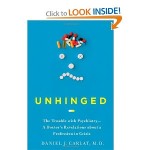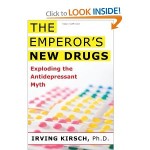Antipsychotics and Mental Illness: the Great Debate
The New York Times Book Review article is entitled:
The Epidemic of Mental Illness: Why?
(June 23, 2011, Marcia Angell)
This is the first of two parts, reviewing several books which plan to explode the belief that mental illness is caused by chemical imbalance in the brain. Instead, these books claim, the imbalance of neurotransmitter levels in the brain only appear after psychiatric medications have been administered.
They point to the standards allowed by the FDA which permit drug companies to get approval for new medications, as long as they have proof of two studies showing a positive effect - no matter how many studies also were made, showing no improvement at all vs. placebo.
Okay. I'll bite. But as further evidence that new drugs are "creating" more mental illness symptoms than curing them, the article states that Robert Whitaker, author of Anatomy of an Epidemic: Magic Bullets, Psychiatric Drugs, and the Astonishing Rise of Mental Illness in America, contends that, in the past:
"conditions such as schizophrenia and depression were once mainly self-limited or episodic, with each episode usually lasting no more than six months and interspersed with long periods of normalcy"
Really? I mean, come on. Listen, all I can go by is my own son, and the illness I witnessed as it slowly developed, progressed, and took hold. What I did not see - before he was on medication - were any "periods of normalcy", much less long ones.
[caption id="attachment_72" align="alignleft" width="100" caption="Unhinged"] [/caption]
[/caption]
[caption id="attachment_73" align="aligncenter" width="100" caption="Emperor's New Drugs"] [/caption]
[/caption]
[caption id="attachment_74" align="alignright" width="100" caption="Anatomy of an Epidemic"] [/caption]
[/caption]
Don't you think I'd give anything to see my son be able to get off the drugs that have side effects like lethargy, weight gain, cloudy thinking, and now- if you buy what these books are saying - possibly brain shrinkage? Of course I would. And if his illness could be reduced to only occasional "episodes" between "long periods of normalcy" - woo hoo! But, sorry to, say that was not our experience before his meds, and it's hard to believe it would be true now.
If you've ever watched your child slowly deteriorate without relief, if you've seen him talking to the shrubs in the yard and claiming they told him the secret of life, eying a beloved aunt suspiciously, having active conversations with people you can't see, or in the back of a squad car in handcuffs after wandering around the county for over 40 hours looking for a "friend" - well, then it's hard to think that normalcy will return soon without help.
All I know is this right now: stay on the meds, life can progress. School, work, relationships. Go off the meds, here comes the ambulance. I applaud any insight that will lead to better treatment, believe me. But - at least where schizophrenia is concerned - medication is still the cornerstone of treatment that needs many more bricks to stand tall.
APA Reference
Kaye, R.
(2011, June 10). Antipsychotics and Mental Illness: the Great Debate, HealthyPlace. Retrieved
on 2025, November 30 from https://www.healthyplace.com/blogs/mentalillnessinthefamily/2011/06/antipsychotics-and-mental-illness-the-great-debate
Author: Randye Kaye
Again me, Ms Kaye, to confirm that this article is boosting many enigmas in the treatment of psychiatric patients. Beforehand, it is well-known that our current acquaintances on mental illness are limited. In consequence, their treatment is yet under an reexamination both from professionals and exploiter of the same. In the middle of them stands producer of drugs, with its economic calculation, in first place. Every side in this transaction of services should to estimate that the health of patient is primary profit. As belongs to antipsychotics, the issue don't make any substantial difference. However, these drugs are the medication of choice in psychotic disorders as well as to many other serious mental illness. Against their side effects, they have dramatically improve the long-lasting prognosis of these mental disorders. It is very important to respect all recommendations of psychiatrist in medication with antipsychotic, in order to avoid their dangerous side effects. Above all, it is absolutely useless to use simultaneously some antipsychotics, such inherently practice any therapist.
As Annette said - "does alot better AND feels alot better on his meds."
Yes, that be the ticket. I truly feel the exact same way. I would be totally crazy and probably homeless if it wasn't for the anti-psychotic meds. They have got alot better then they were in the 90's.
Thanks, Ken. and now the challenge is to make them even better so the side effects don't discourage compliance - and keep the support programs realistic and aware. After six years of success, my son Ben - just recently moved, too abruptly from group housing to independent living with NO transitional services - has just gone back into the hospital, refusing to take Clozaril again. They let him slip too far before stepping in. Grrr! This will be my next post subject on Tuesday. Recovery is, indeed, a rocky road but without the right meds the journey cannot even begin.
I think for each parent who has a child who has been "diagnosed" mentally ill it boils down to what do we want to believe about this person. I chose to believe that the person is trying to tell us something important about life, about our relationships. I chose not to believe that behavior can simply be put down to brain wiring gone awry. Which is more affirming if you are the so-called patient? Can you get well when everybody looks and treats you like you sick? Probably not. Can you get well if people put down your thoughts as the ravings of a lunatic? I doubt it. The Whitaker book is an especially important book, but it's going to make a lot of people feel uncomfortable because it exposes the shaky science behind the medical cure that many people have been relying on. Dr. Nancy Andreasen made her reputation on the whole theory of psych drugs "protecting" the brain, and then suddenly, whoops, she did further research and came to the horrifying conclusion that the drugs actually damage the brain in the long run. She sat on that information for two years because she didn't want people to jettison their psych meds (we all know what happens when you suddenly drop them.) So, Dr. Andreasen is a big part of the problem, but hey, it's not her life, is it? She makes money figuring that the rest of us are idiots. The only way some people will feel good about this is to hope that she will change her mind again in favor of untreated schizophrenia damaging the brain, but why would we wish for a damaged brain? It goes against God, when you think of it. We are all perfect in his presence, aren't we? Here's the link to the Andreasen article if you are not already familiar with it. http://www.nytimes.com/2008/09/16/health/research/16conv.html
and here's an extract. Shame, shame, I say.
Q. AND WHAT HAVE YOU FOUND?
A. I haven’t published this yet. But I have spoken about it in public lectures. The big finding is that people with schizophrenia are losing brain tissue at a more rapid rate than healthy people of comparable age. Some are losing as much as 1 percent per year. That’s an awful lot over an 18-year period. And then we’re trying to figure out why. Another thing we’ve discovered is that the more drugs you’ve been given, the more brain tissue you lose.
Q. WHY DO YOU THINK THIS IS HAPPENING?
A. Well, what exactly do these drugs do? They block basal ganglia activity. The prefrontal cortex doesn’t get the input it needs and is being shut down by drugs. That reduces the psychotic symptoms. It also causes the prefrontal cortex to slowly atrophy.
If I were developing new drugs, I’d switch targets. Till now it’s been chemically formulated targets. I believe we should be thinking more anatomically and asking, “With schizophrenics, which brain regions are functioning abnormally?”
...and this is why I titled the entry "the great debate" - there is so much to learn, so much to look at, I agree. Like you Annette, I know that my son only does well when on his meds - like, 2 days without and he breaks. But I certainly wish there were a better way. I feel like we've tried - and paid for - every alternative under the sun and right now the meds are clearly the cornerstone of a recovery plan that works only if he takes his meds. But the rest of the plan must include emotional needs, structure, purpose etc. Thanks for your thoughts!
Randye
All I know is that my husband, who's diagnosis is schizophrenia and bipolar, does a lot better and feels a lot better on his meds.
You write as only a mother who has been there, done everything and lived "it" has the right to respond as you did.
Continue to advocate for Ben and always keep your eyes and ears open to all those who come up with new theories, new ideas about medication, and trust your gut and their proof. In the meanwhile, here's hoping that Ben continues to thrive for longer and longer periods, and should he slip that it's brief and taken care of by whatever works best for him.
I hope your response helps patients who will only be confused by the above findings. But that's medicine and science. Research and findings -until and unless truly proven - change from day to day, month to month, year to year. Something we have to make sense of for ourselves and never take as gospel.
Keep being a voice for Ben and for your truth!
Linda - thanks so much for your insightful and supportive comment! I will follow your excellent advice :)
Thanks, Michele - your perspective is so helpful. I agree meds have to be improved, but until then...the right mix can help a lot. Hope the new pdoc helps.
I totally agree. I have bipolar and before I was diagnosed (I was diagnosed at 32) I had long periods of depression, I would just lay around and sleep all day wishing I was dead. Then after the meds I was okay for a while but am now in a depression again, first I was hypomanic, and have been like this for 6 months. I actually have not been right for 3 years. But I'm seeing a new pdoc so hopefully he can help.
Michele